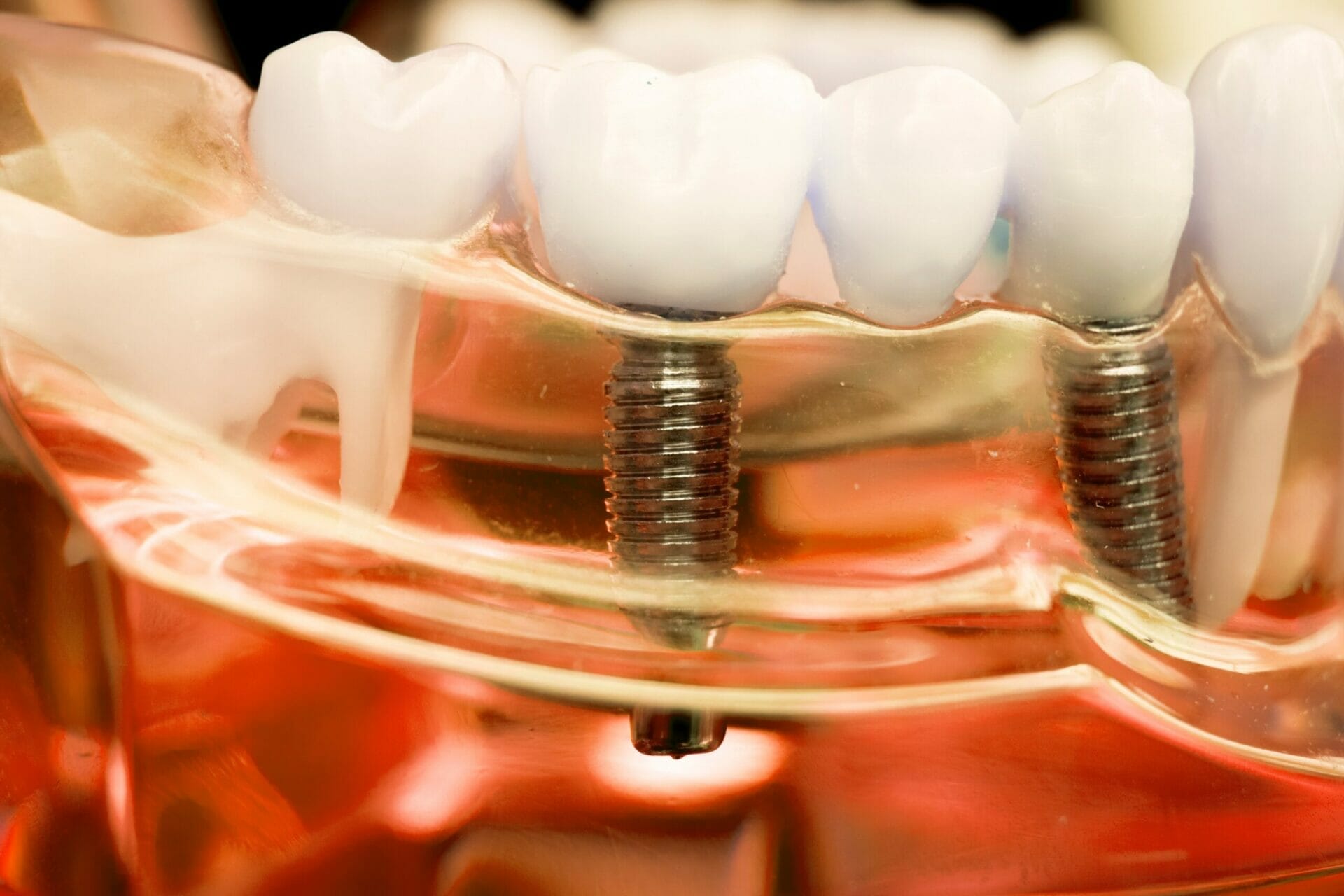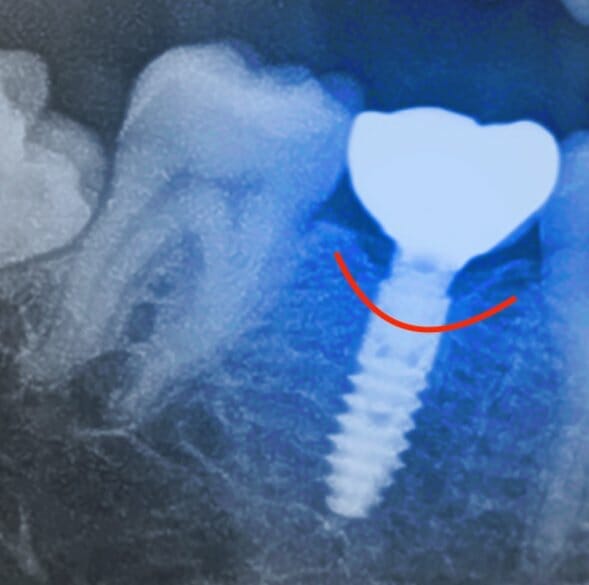
My name is Kyle Hornby and I am a Kitchener-Waterloo Dentist. Each week I tackle common dental topics to raise the bar on dental health knowledge available to the public. My overall goal is to help patients make more informed dental health choices. This week, I'd like to discuss Dental Implant treatment. Here we go!
Dental Implants have evolved into the "gold standard" replacement option for missing teeth. The dental implant crown is widely accepted as the replacement option most like a natural tooth. Placement, healing and restoration with an implant crown are all predictable processes. A large volume of research supports the use of dental implants. However, there are several fundamental differences between dental implants and teeth that are not common knowledge amongst the general public. It is important that patients know as much about limitations with dental implants before pursuing this treatment option.
Below, I discuss differences between dental implant crowns and natural teeth and how these differences can affect the success of your implant treatment. I hope this information will provide patients with a foundation for deciding whether implants are right for them.
The most important difference between a dental implant and your tooth root is that the dental implant is is in direct contact with bone, and it does not enjoy any cushioning from a periodontal ligament. Natural teeth do, however, enjoy this cushioning from the periodontal ligament and so they can tolerate much greater forces during chewing.
Dental implant crowns must have very minimal opposing tooth contact. If the implant crown is under excessive force during function then bone loss around the implant will occur. Adding to this challenge is the fact that opposing teeth can change position over time. It is common that 2 years or more after delivery, opposing tooth contact and related chewing forces on your implant crown will have increased. So your Dentist must be constantly checking biting forces on your implant crown and making necessary adjustments. Additionally, if you grind or clench your teeth when sleeping, your Kitchener Dentist will recommend a night guard to cushion and protect your teeth and implant crown. Unlike natural teeth, implant crowns require much greater attention and monitoring over time.

If you take a look at the x-ray image on the left you will see a bright white screw and attached crown toward the bottom left. This is what a dental implant crown looks like in an x-ray.
You will likely notice that the shape of the implant, which supports a molar crown, is much thinner and with less flare than the molar tooth roots beside it. If you look at the natural teeth, their roots are thin at the tips and they flare out as they get closer to the tooth crown. So, the roots support almost all of the tooth crown directly above. The implant crown, in contrast, provides a very straight "root" without any flaring or contour. I think you will agree that roughly 75% of the implant crown has no direct support underneath.

This difference in implant shape provides the basis for some unfavourable mechanics during chewing. As forces change on the surface of the crown during chewing, a significant "seesaw" or lever effect becomes possible. This often leads to the characteristic bone loss crater seen around implants over time (see area above red curve in the image at left).
This bone loss will not compromise the implant. It does, however, underscore the importance of monitoring forces on the implant crown over time as a patient's bite changes. Failing to do so will lead to more bone loss. It also suggests that designing an implant crown to minimize harmful lever forces is critically important to long term success.
If you minimize the front-back length of the implant crown above, you'll have gaps between it and the neighbouring teeth. Those gaps will allow for constant food impaction, inflammation and bone loss over time. That is absolutely not an option. However, your Kitchener Dentist can minimize the width of the implant (that is, the tongue side to cheek side dimension). Most implant crowns have this design feature without patients being aware of it. This makes the crown much smaller compared to the natural tooth that it has replaced. If you have an implant crown, chances are it is providing you with significantly less chewing surface than you think. This might not be a deal-breaker for most people, but you should still be aware of it.
The shape of implant and crown also has an influence on how it must be cleaned. If you refer to the x-ray image above, you'll notice the amount of dark space under the crown is large. Compared to a natural tooth, an implant crown is far more susceptible to food and plaque trapping under the gums. This implies that you should be flossing to clean this area with greater frequency (ideally 2-3 times a day). Additionally, manipulate your floss back-to-front and side-to-side within the gum pocket to sweep out food debris from underneath the crown. Cleaning around an implant crown is more technique-sensitive than cleaning around a natural tooth. Make sure you're up to that challenge if you are considering dental implants.

Once your jawbone has healed around your dental implant(s), it is time to restore them with a crown. Be aware that you will, in most cases, have 2 choices. Implant crowns can be attached to the dental implant by cement. The other option is to have a crown that you can screw into the threaded column inside your implant. In some cases, proper angulation cannot be achieved to enable a screw-retained implant crown. Here are strengths and weaknesses associated with each type of implant crown:
Yes, they can. Patients tend to have the impression that a dental implant is forever (this is likely . It is certainly possible that an implant can last you for the rest of your life. But, be aware that this does not always happen. The failure rate is higher in individuals with systemic conditions that compromise healing (i.e. Diabetes). The failure rate is also very high in smokers.
Failure amongst prime candidates is usually due to implant placement in thin or weak bone. It could also result where an implant crown is under excessive functional force over a number of years. Given that a single implant crown can cost between $4,000 - $6,000, it is critical that patients fully understand failure rates. Moreover, they need to be told about maintenance challenges and limitations/shortcomings associated with dental implants.
Dental implants are often promoted as being superior to dental bridges. Implant crowns do offer some advantages:

However, dental bridges do offer some advantages over implant crowns:

So, remember that the condition of other teeth can change how we look at different treatment options. The best solution for Patient A might not be the best solution for Patient B. It's important to have a thorough discussion of available treatment options with your family dentist before embarking on restorative treatment. And don't rush into a decision. Often times the best choices come from multiple discussions/consults and careful thought over a year or two.
Implant dentistry provides wonderful solutions for replacement of missing teeth. While expensive, many patients are very happy with their implant restoration(s). My goal with this article is to provide patients with a better understanding of the technical aspects of implant dentistry. This will enable them to make the best restorative decision for themselves. Ultimately, a thorough discussion with your Kitchener Dentist will give you the foundation necessary to make a great restorative decision. Remember that communication is one of the major keys to long-term treatment success!
Having your Dentist place implants is not a painful process. The procedure may take 40 - 90 minutes depending on the complexity of your case. Although treatment sequence and total appointment number can vary, you'll generally have a 4-month healing period after implant placement. During this time, your Dentist will close the gums back over the implant for healing.
After the placement appointment, you'll likely receive a prescription for anti-inflammatory pain control medication. This is to prevent the onset of mild pain or discomfort you might otherwise feel for a day or two after the procedure.
Dentistry is expensive. Treatments are expensive. Ongoing preventive care is expensive. Dental implant costs are set according to the fee guide set out by your provincial dental association. The fees account for the many appointments necessary during placement, healing and restoration (when your Dentist places a crown on your implant) of your dental implants.
There are also equipment costs that make up part of the overall fee for implants. These amounts cover the titanium implant screw, metal healing cap which helps to shape the gums around your implant, and other implant components. Part of the high cost is due to lab fees your Dentist will pay a local dental laboratory for their work in making custom implant components.
All of this for a single replacement tooth!
While implants can be costly, thorough treatment and excellent ongoing maintenance at home can provide a long-lasting, tooth-like solution.
Yes and no. There are a number of Dentists out there who offer "Teeth in a Day". The idea is that all implants and the prosthetics to replace teeth are installed one a single day. This is very technique-sensitive and has a higher failure rate, but it can be done. However, patients will often need to return to their Dentist for follow up exams and tweaks or adjustments.
So, if you pursue teeth in a day (still a very convenient solution), be aware that you'll need to return periodically as implants heal to have the Dentist make sure that all is proceeding properly.
If you would like to discuss tooth replacement solutions with Dr. Kyle Hornby, please call us at (519) 576-8160 or request an appointment online here.
This article is intended to promote understanding of and knowledge about general oral health topics. It is not intended to be a substitute for professional advice, diagnosis or treatment. Always seek the advice of your Dentist in Kitchener with any questions you may have regarding a dental condition or treatment.
